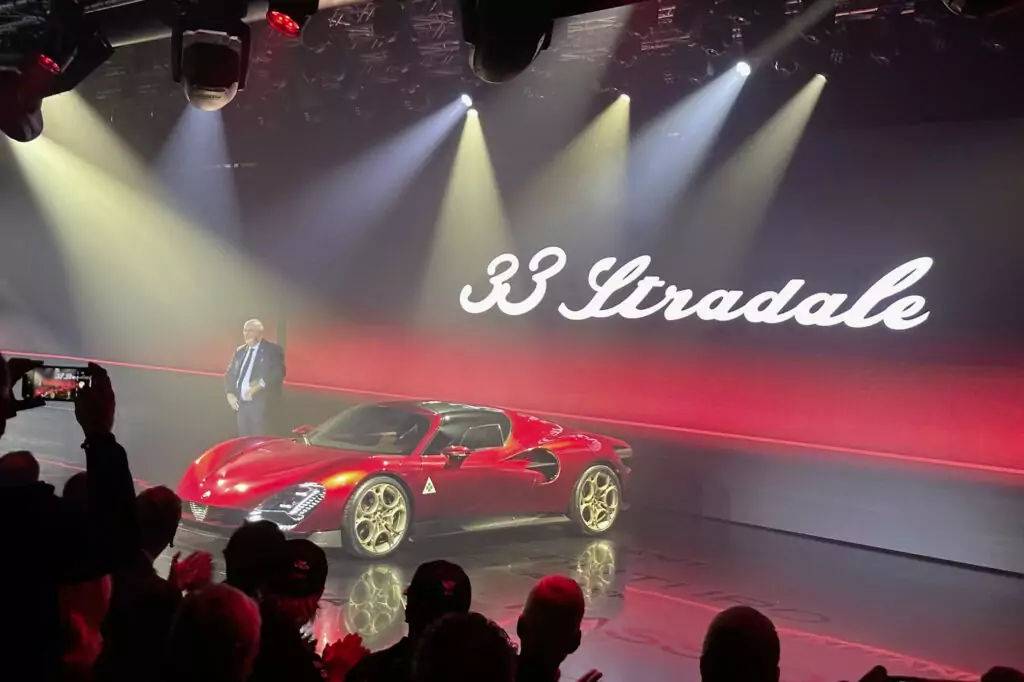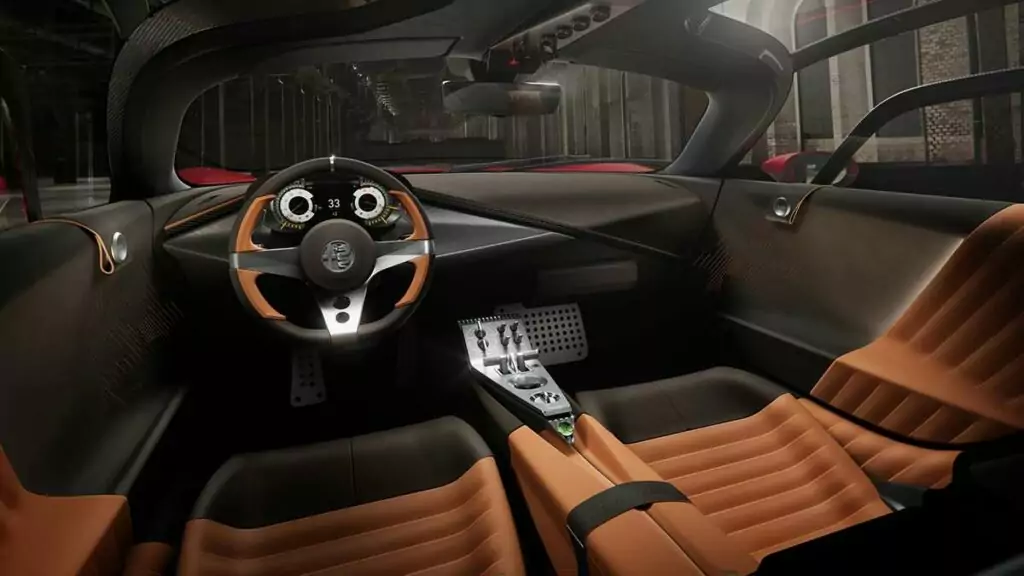Alfa Romeo has introduced a contemporary, all-electric version of the 33 Stradale, drawing inspiration from its iconic 1960s sports car. Only 33 units of this supercar will be built, making them a rare commodity.

✅ AI Essay Writer ✅ AI Detector ✅ Plagchecker ✅ Paraphraser
✅ Summarizer ✅ Citation Generator
With a history spanning over 110 years, Alfa Romeo is known for its roots in motor sports and luxury vehicles. After its merger with Stellantis in 2021, the automaker announced plans to release a new model annually from 2022-2026, with a vision to be fully electric by 2027.
The company is targeting the luxury car segment, including electric SUVs for the US market, to rival brands like BMW. The highlight, however, is the two-seater 33 Stradale coupé. This electric vehicle boasts over 750 horsepower, a top speed of 206 mph, and a range of approximately 280 miles. Each of the 33 units will be handcrafted, reflecting the company’s rich heritage. They feature unique designs, including an aircraft-style console and cockpit-like interiors. CEO Jean-Philippe Imparato emphasized that this model honors the brand’s history and sets the stage for future innovations.

Supercars, with their allure of speed, luxury, and cutting-edge technology, are not without controversies. The following are some angles from which one could research and debate the topic of supercars:
Environmental Concerns:
- Supercars are often designed for high performance and not necessarily fuel efficiency. Their larger engines can consume more fuel and release more carbon emissions compared to average cars.
- The production and disposal of the exotic materials used in many supercars may have a substantial environmental footprint.
Economic and Social Implications:
- Supercars can be seen as a display of wealth and might perpetuate income inequality and societal divides.
- The resources poured into developing luxury supercars could be directed to more sustainable and universally beneficial transportation solutions.
Safety Issues:
- The high speeds achievable by supercars can lead to dangerous situations on public roads.
- The design and features in supercars might encourage reckless driving.
Technological Reliability:
- As supercars often incorporate the latest technological advancements, there might be concerns about the reliability and long-term durability of these features.
- The increased use of electronics can raise questions about vulnerabilities to hacking.
Impact on Urban Infrastructure:
- Supercars can be louder than other vehicles, which might be a nuisance in urban settings.
- The high performance and speed of these cars might not be appropriate for crowded urban settings, raising the question of their practicality in such environments.
Ethical Production:
- The materials used in supercars, such as rare metals for batteries or luxury trims, might be sourced from regions with dubious labor practices or from ecologically sensitive areas.
The Future of Supercars in the Age of Electric Vehicles:
- The rise of electric vehicles (EVs) raises questions about the future of gasoline-powered supercars. Are EV supercars the future, and will they be embraced in the same way?
- As nations impose stricter emissions standards, the traditional supercar model might face challenges.
Cultural Implications:
- The culture around supercars often emphasizes luxury, exclusivity, and opulence. Does this perpetuate materialistic values in society?
- Some argue that supercars, with their unique designs and performances, are a form of art. How does this perspective balance with the practical and environmental concerns?

Supercar and luxury vehicles essay topics:
History and Evolution
- The inception of the supercar: Tracing back to the earliest models.
- Evolution of design: How supercars have transformed over the decades.
- Pioneers of the supercar era: Brands and personalities that shaped the landscape.
- Supercars in popular culture: From James Bond to Fast & Furious.
- Milestone moments: Supercars that have broken speed and design barriers.
Technology and Engineering
- The engine dynamics: What powers the fastest cars in the world?
- Aerodynamics in supercar design: Balancing speed and stability.
- The rise of electric supercars: Brands like Rimac challenging the status quo.
- Advanced materials: Exploring carbon fiber, titanium, and other materials in supercar construction.
- Innovations in braking and suspension: Ensuring safety at high speeds.
Economics and Market Dynamics
- The business of supercars: Profitability vs. brand prestige.
- Examining the clientele: Who buys a supercar and why?
- Resale value dynamics: Supercars as investments.
- The role of limited editions and exclusivity in pricing.
- Challenges and opportunities in emerging markets for supercar brands.
Environmental Impacts and Sustainability
- Carbon footprint: Assessing the environmental impact of supercars.
- Transitioning to green: How supercar manufacturers are embracing sustainability.
- Electrification and the supercar: Challenges and opportunities.
- Eco-friendly materials and manufacturing processes in the supercar industry.
- The role of hybrid technologies in reducing emissions.
Culture and Society
- Supercars as status symbols: Exploring societal perceptions.
- The allure of speed: Psychological appeal of supercars.
- Supercars in media and their influence on youth and car culture.
- The juxtaposition of supercars in global cities: Opulence amidst urban challenges.
- Car shows, expos, and the fandom surrounding supercars.
Future Predictions and Trends
- The next generation: Predictions for the supercars of 2050.
- Augmented reality, AI, and the future of the supercar driving experience.
- Potential of self-driving supercars: A contradiction or the future?
- Supercars in space? Elon Musk’s Tesla in orbit and the implications for brand marketing.
- Adapting to global challenges: How will supercars navigate future economic and environmental challenges?
Follow us on Reddit for more insights and updates.





Comments (0)
Welcome to A*Help comments!
We’re all about debate and discussion at A*Help.
We value the diverse opinions of users, so you may find points of view that you don’t agree with. And that’s cool. However, there are certain things we’re not OK with: attempts to manipulate our data in any way, for example, or the posting of discriminative, offensive, hateful, or disparaging material.